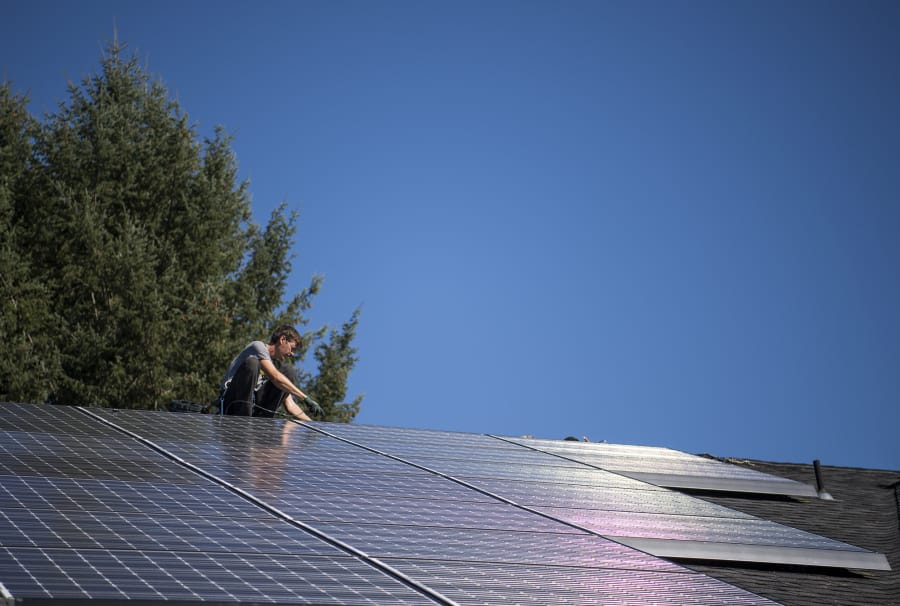RIDGEFIELD — In the event of a power outage — or any kind of disaster, really — a 6,700-square-foot home in the middle of a grassy field near the Clark County Event Center at the Fairgrounds is being built to be a safe haven.
It will withstand pretty much anything besides a volcano or big earthquake, said Troy Johns, owner of Urban NW Homes and mastermind behind the sizable custom-built home.
“The pantry is as big as my living room,” he said.
Among the home’s features: an oversized tank for water storage, geothermal heating, a panic room and an air filtration system that mirrors what NASA uses to prevent people from getting sick in the space station.
Besides the size and specs, there’s another attribute that makes this abode unusual. When it’s complete sometime this spring, its owners will join a rare breed of Clark Public Utilities customers: those who have the ability to go off-grid.
The home is equipped with three Tesla Powerwalls, large batteries that store electricity. In the event of a power outage, the home will have essential power and utilities for two to three weeks, Johns said. After calculating and recalculating the home’s energy loads (there’s a lot of math involved), Johns determined he’ll need 32 solar panels to power the house. They’ll line the trees at the back of the property.
Just nine local utility customers have battery backup systems, said Bart Hansen, who oversees the utility’s net metering program. These customers have a transfer switch bypassing the electrical grid.
“You become your own island,” relying on your home’s battery, he said.
For the vast majority of the utility’s 900-some solar customers, the utility serves as their battery. When the panels generate power, they’re depositing energy with the utility. When the home needs power during cold, cloudy days they withdraw it. The difference between the two is what informs the electrical bill; and net zero, where a home makes as much energy as it consumes, is as good as it gets.
If the power goes out, the solar panels turn off.
“To do an off-grid home is definitely a change in lifestyle,” Hansen said, though he doesn’t consider these battery backup homes truly off-grid.
The cost of installing a battery backup system can outweigh the benefit, given the utility’s reliability. He pointed out that winter the most common time for power outages, and summer is when solar arrays are generating the most energy.
Last year, an average Clark Public Utilities customer was out of power for 38.6 minutes, not including storms or outside utility providers, well below the 137-minute national average. A downed wire caused an outage in La Center on Monday that left 28 customers without power for more than an hour.
Erica Erland, spokeswoman for Clark Public Utilities, said the utility does a lot of proactive work such as trimming trees and treating underground cables to keep the system reliable for its nearly 190,000 customers.
In the eight years she’s worked at the utility, the largest outage she can recall is a winter storm in 2014 that left 60,000 customers temporarily without power. Customers living in rural areas are more likely to experience longer outages because they’re further away from substations.
Bill Kirk, who lives in Battle Ground and owns a solar array, said he’s interested in getting a battery, just not anytime soon. A self-described “retired geek” (he was the director of technology at Warner Pacific University), Kirk said he’s crunched the numbers.
“(Clark Public Utilities) is just too reliable, and the cost of batteries is just too much now,” he said. “Although I have this tree hugger in me, I still come from a dollars-and-cents view.”
Still, those in the renewable energy industry think more people will want the ability to go off-grid.
Battery backup systems give people a feeling of security and resiliency, said Jordan Weisman of Washougal-based Sunbridge Solar. The batteries can be set to maximize consumption or use as little power as possible, which gives homeowners more control over how their energy is used.
“There are definitely a lot of people who are concerned about a major event, an earthquake. They’re concerned the grid is going to go down for a long time,” he said.
It used to be that none of the solar systems Weisman installed had battery backups, but now about 10 percent of them do. Batteries such as the LG Chem ESS Battery are backordered nationwide, he said.
“As batteries go down in price, it’s going to be more cost-effective,” he said. They currently run about $10,000, or as low as $50 to $60 monthly with financing plans. “They’re able to keep lights on, keep the refrigerator on, keep critical loads on for an extended period.”
Some people, such as those who live by Mount St. Helens, are too far away from the electrical grid and have battery systems installed to use instead of gas or propane powered generators.
“I don’t think we’ve done a truly off-grid system for anyone in Clark County,” Weisman added.
Urban customers, like John Zamberlan and Suzanne Anderson in Salmon Creek, have other motivations. The couple got solar panels and a Tesla Powerwall installed in their ranch-style home in late July and then had a barbecue where people could come check out the system.
While it’s no techy-looking flux capacitor a la “Back to the Future” (it’s a silver box and two white boxes), Anderson hopes the system get more people thinking about solar.
She said if there was a power outage, their 1,596-square-foot home could be powered for a few days. In the last five years, she can recall maybe three outages, primarily due to winter storms. The battery powers specific things: heating and cooling systems, the refrigerator and garage, for instance, but not the closet lights or dishwasher, which they deemed not necessary in case of an outage.
Someday, Anderson hopes to get a battery-operated car that she’ll charge by plugging it into her home, which is powered by solar panels.
“The sun will run my car,” she said. “I’m so excited I can’t wait.”
Not everyone is so enthusiastic about their solar system.
Patrick Faris, who lives in Camas, said he regrets having solar panels installed on his roof about three years ago. He said the interest on the loan far exceeds the money savings on his electrical bill, and he’s unsure how long it’ll be until he needs to move the solar panels to replace his roof.
“I would’ve rather kept my money, put it into an investment and paid my electric bill. I would’ve been far ahead,” he said. “I do not see the cost benefit coming out of this.”
He does not plan to buy a battery to store his panels’ power.
Costs can mount after the initial purchase, since batteries eventually die and have to be recycled, Johns said. Similar to recycling electric car batteries, he said there has to be a way to protect ground water from the harmful materials in the batteries. How we solve those problems, he said, will determine how we move forward.
For people who are interested in batteries, Weisman thinks more will make the investment as batteries come down in price. He believes the future of the power grid is more homes with smart meters that measure energy consumption and can interact with battery systems, perhaps using stored energy when demand on the grid is high.
Johns pointed to California, which is steering home construction toward renewable energy. The state recently passed a law where starting in 2020 new homes have to be built with solar panels.
“At some point it will probably happen here,” Johns said. “Customers will demand it. I don’t think anybody will want an electricity bill in 20 years.”




